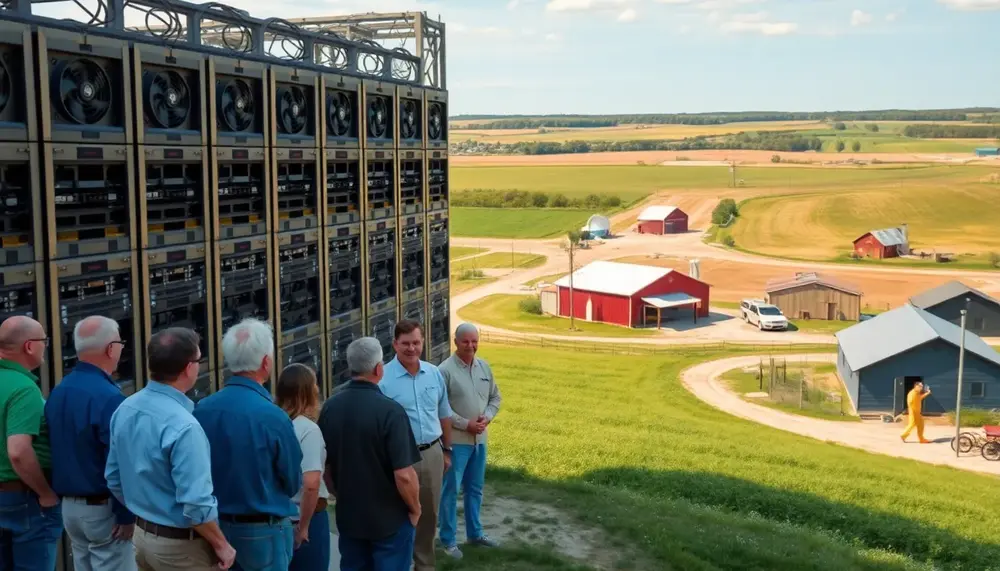Table of Contents:
Resistance Against Crypto Mining Projects in Arkansas Intensifies
In the small city of Vilonia, located north of Little Rock, the local planning commission has once again unanimously rejected a proposal for a crypto-mining project. The project, supported by Interstate Holdings Blockchain and the Arkansas Blockchain Council, failed to secure a special permit due to prevailing concerns among residents regarding noise, electricity consumption, and strain on the local internet infrastructure. According to it boltwise, the community voiced fears that such a facility could disrupt the tranquility of their town, with one resident questioning whether moving to Arkansas—known as the 'Natural State'—was a mistake, given its emerging reputation as a 'Bitcoin Mining State'.
Proponents of the mining project argued that the facility would have minimal impact and could contribute up to $14 million to the local community. Despite these arguments, the commission prioritized preserving the peaceful character of Vilonia. This marks the second time within a year that a crypto-mining initiative has been rejected in the city.
| Key Concerns | Details |
|---|---|
| Noise | Potential disturbance to residents |
| Electricity Consumption | High energy demand from mining operations |
| Internet Strain | Possible overload of local infrastructure |
| Economic Impact | Up to $14 million potential community contribution |
- Unanimous rejection by the planning commission
- Second rejection of a similar project within one year
- Concerns over quality of life and local resources
Infobox: The Vilonia case highlights growing local resistance to crypto-mining in Arkansas, with economic incentives failing to outweigh concerns about noise, energy use, and community well-being (Source: it boltwise).
Regulatory and Economic Pressures on Crypto Mining in Arkansas
Currently, there are 19 operational crypto-mines in Arkansas, with many more across the United States. However, the industry faces increasing challenges. Former President Donald Trump aimed to position the U.S. as a global leader in Bitcoin production, but his trade wars have significantly raised operational costs. Tariffs on Chinese mining equipment now exceed 150% in some cases, directly impacting the profitability of mining operations.
Additionally, the Democratic Party is pushing for the Clean Cloud Act, a legislative proposal that would introduce carbon fees for energy-intensive businesses starting in 2026. This would place further pressure on miners, especially those reliant on fossil fuels. These developments underscore the complex interplay of political, economic, and local factors shaping the future of crypto-mining in the U.S.
| Factor | Impact |
|---|---|
| Trump Tariffs | Over 150% on Chinese mining equipment |
| Clean Cloud Act | Carbon fees for energy-intensive operations from 2026 |
| Operational Mines in Arkansas | 19 |
- Rising equipment costs due to tariffs
- Potential new carbon fees increasing operational expenses
- Uncertain regulatory environment for future projects
Infobox: The crypto-mining sector in Arkansas and the broader U.S. faces mounting economic and regulatory hurdles, with tariffs and proposed environmental legislation threatening profitability and expansion (Source: it boltwise).
Legal Disputes and Community Pushback
Legal conflicts have also emerged, with the Arkansas Cryptomining Association filing lawsuits against state officials over what they describe as discriminatory crypto-mining laws. The industry is under scrutiny not only for its environmental impact but also for its legal standing within the state. New regulations are being considered by the Arkansas Oil and Gas Commission, adding another layer of complexity for mining operators.
- Ongoing lawsuits regarding crypto-mining regulations
- New rules proposed by the Arkansas Oil and Gas Commission
- Community activism influencing local policy decisions
Infobox: Legal and regulatory uncertainties, combined with active community resistance, are shaping the landscape for crypto-mining in Arkansas, making future projects increasingly difficult to realize (Source: it boltwise).
Sources:















